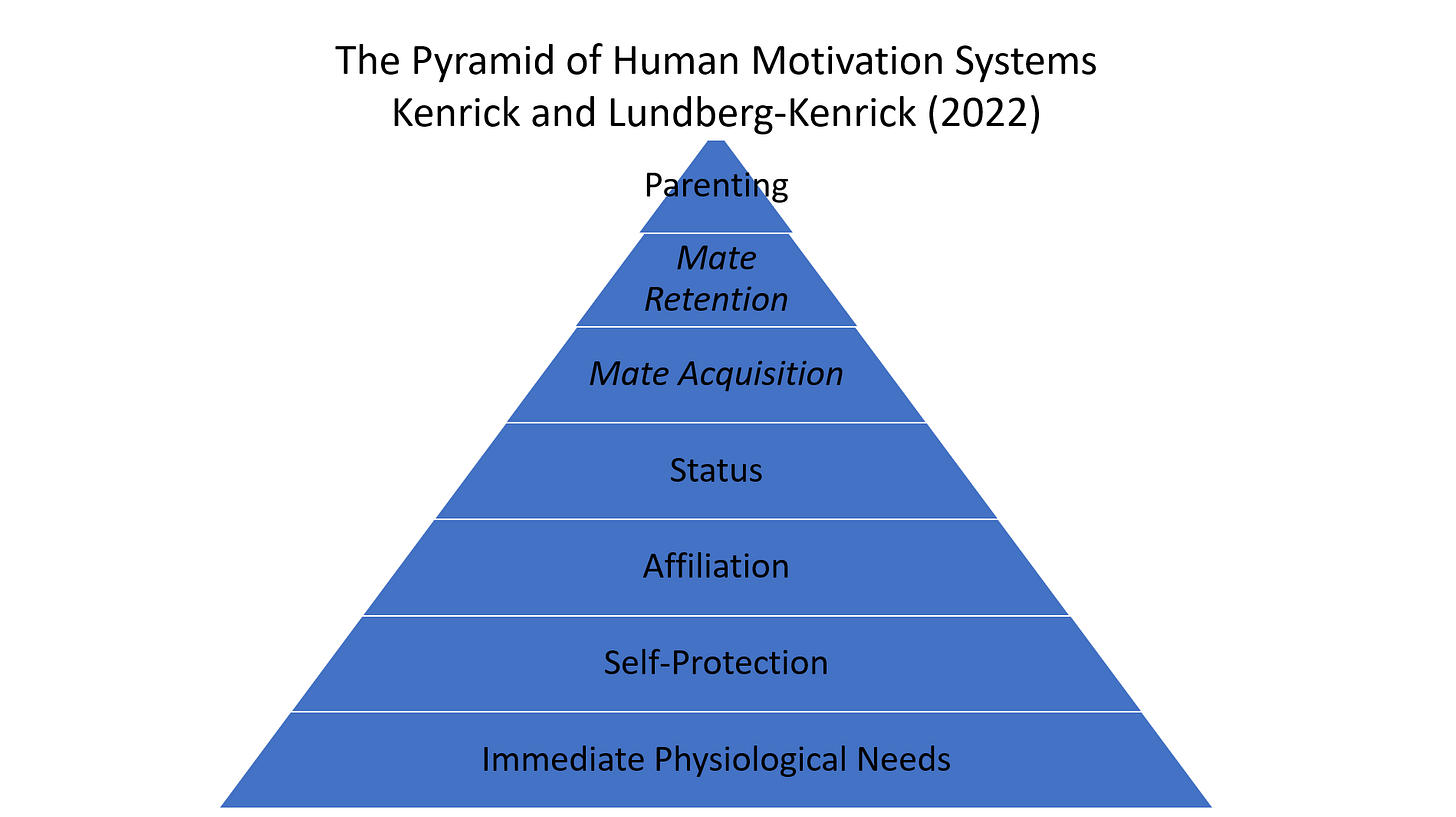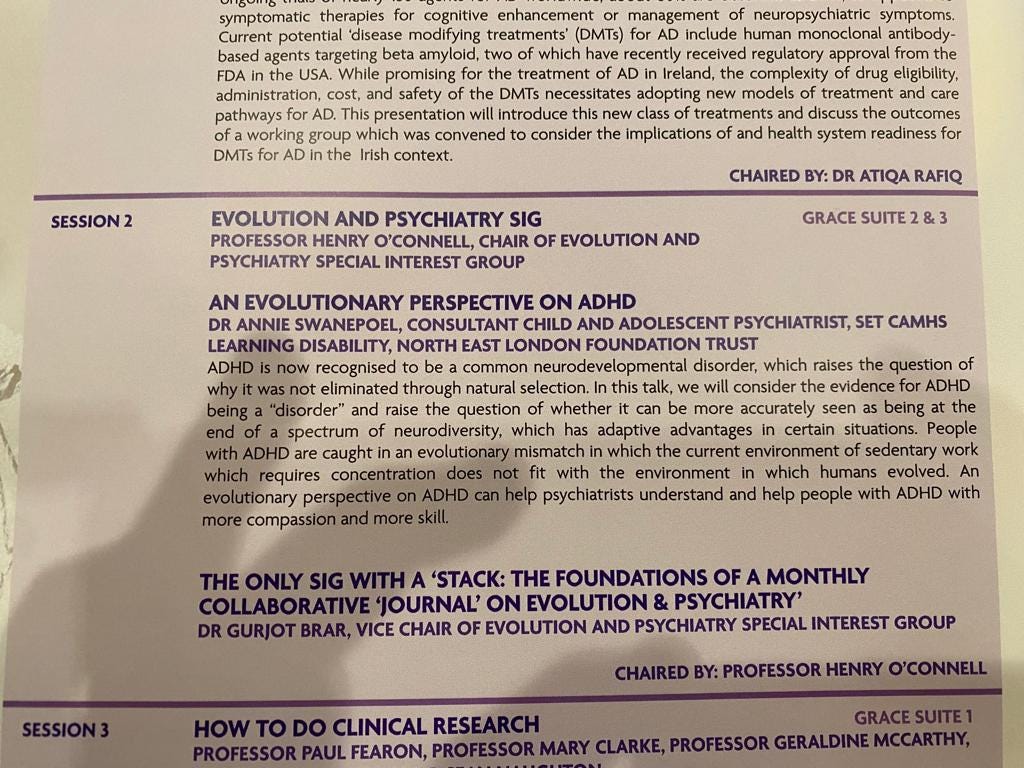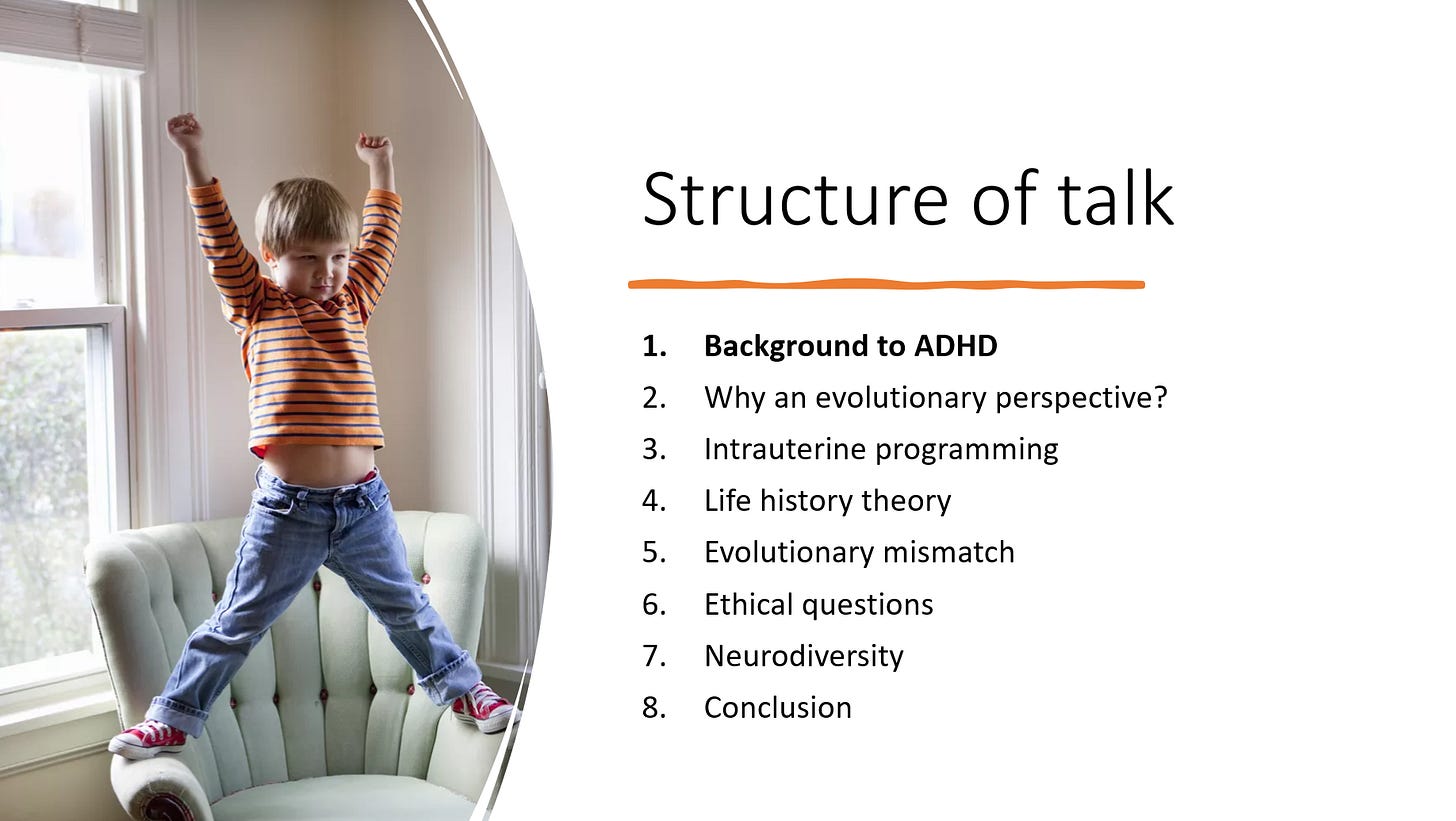A Tale of Two Meetings
Dr Gurjot Brar and Prof Henry O'Connell provide a write-up of two recent milestone evolutionary psychiatry meetings in Ireland
A) Midlands Portlaoise Evolutionary Psychiatry Meeting
Friday 13th October 2023

1) Evolutionary Theory is the Missing Framework for Psychiatry and Medicine
Dr Riadh Abed, FRCPsych
Retired NHS Psychiatrist, Hon. Sen. Lecturer and Medical Director
Currently Medical Member of the Mental Health Tribunals in England
Former (Founding) Chair, Evolutionary Psychiatry Special Interest Group, RCPsych (EPSIG) (Currently Finance Officer)
Chair, Section of Evolutionary Psychiatry, WPA
Thank you Riadh for for your excellent keynote talk in the Midlands, perhaps we could begin by you giving us a brief outline of your talk?
My presentation aimed at illustrating some of the major benefits that accrue from evolutionary thinking in medicine and psychiatry. This would be through highlighting how evolutionary thinking can widen and enrich our understanding of causation and I will then discuss how the evolutionary concept of mismatch can help us gain a better understanding of the basis of human vulnerability to disease and disorder. The theme for the remainder of my talk was around the concept of evolutionary mismatch and how it can shed light on the roots of the so-called diseases of civilisation but with a particular focus on 2 conditions: loneliness and eating disorders.
I know you have raised some issues about current mainstream psychiatry, would you care to elaborate?
From the evolutionary point of view there are a number of problems with current mainstream psychiatry. I should emphasise at this point that while evolutionists are critical of mainstream psychiatry, our criticism is aimed at improving rather than rejecting or demolishing it. Evolutionists share with mainstream psychiatry both a commitment to the scientific method in understanding human suffering as well as the adherence to ethical standards that place the interests of individual patients at the centre of our concerns. In this we part company with the anti-psychiatrists or critical psychiatrists who believe that science has no claim on discovering how the world works. They also reject psychiatry as a legitimate enterprise and deny the reality of mental disorder.
And what do you think of the current paradigm and biological reductionism?
There is a problem with (excessive) Reductionism. Although reductionism can undoubtedly be useful and has led to great advances in science and medicine, it is possible to take this a step too far rendering it counter-productive. Evolutionists argue that biological psychiatry has fallen into this erroneous practice. Excessive and unjustified reductionism is also referred to as eliminative reductionism.
Eliminative reductionism refers to the neglect of emergent properties and assumes that psychological or behavioural phenomena (e.g. mood state or psychotic symptom) are nothing but events at a given receptor site or circuit. This is misleading for 2 main reasons:
1. The emergent properties of neurobiological systems e.g. emotions, cognitions or behaviour are the end-products of selection (that is the phenotypic traits shaped by selection) and not the event at the molecular level. This is due to the fact that the emergent property can be multiply realised i.e. they can be generated through multiple neurobiological routes.
2. The behavioural/psychological emergent properties are the sole basis for determining function and dysfunction. Hence, the functional status of events at the molecular level can only be evaluated with reference to their phenotypic effect at the macro level e.g. the level of organs or the individual. Therefore, we should start with the phenotypic end-products and proceed downwards to their molecular underpinnings and not the other way around. I would argue that this error (the focus on the molecular level) has real life, practical consequences and is not only an academic concern, as it can and does impede an adaptational understanding of the systems involved.
So how can evolutionary science help to remedy this?
One major contribution evolution can make is to provide a framework for the understanding of the human motivational system. Here is Kenrick’s Darwinian reformulation of Maslow’s hierarchy, mapping human motivations onto the tasks of survival and reproduction across the human life course:
Evolutionary biology is, of course, the basic science of EP as well as all other evolutionary disciplines. In addition, EP relies heavily on insights and shares many assumptions and principles both evolutionary medicine and evolutionary psychology where there is 2-way traffic. Also, insights from evolutionary anthropology have been vitally important to EP.
If there was only one key principle you would like to get across what would it be?
This is a cornerstone of evolutionary thinking and is a prime example of the real added value that evolution can bring to the understanding of causation in biology and medicine. This scheme has ancient origins going back to Aristotle but in more recent times it was Ernest Mayr a leading evolutionary biologist of the 20th century who proposed that causes can be understood as ‘Proximate’ or ‘Ultimate’ or Evolutionary and this dichotomy was built upon by Nikolaas Tinbergen, Nobel Laureate and co-founder of the science of ethology. He proposed his now famous 4 questions: 2 Proximate (mechanism and development) and 2 Ultimate or Evolutionary (phylogeny and function). Importantly, all 4 categories of causation apply simultaneously to all biological systems/organs or traits. Evolutionists point out that current mainstream psychiatry and medicine focus exclusively on the proximate and neglect the ultimate thus ending up with an incomplete understanding of disease and disorder. Evolutionary or ultimate causation enable to ask WHY questions that supplement the HOW.
A simple illustration: no matter how much we explore the neurobiological mechanisms and developmental processes that control mood states, we would still be unable to answer the important question of why low mood/ sadness is universal and what possible function this would have served for our ancestors.
Another key cornerstone would be the concept of evolutionary mismatch which is a prime example of the power and evolutionary thinking to illuminate biological phenomena in ways that would simply be inconceivable otherwise.
Thank you very much Riadh for speaking with me. I note you snuck another one in there! (evolutionary mismatch). Unfortunately we didn’t get a chance to discuss everything in your fantastic presentation and we would love to have you back to discuss loneliness and eating disorders.
2) Evolutionary Perspectives on Ageing and Alzheimer’s Disease
Dr Paul St. John-Smith
Retired Consultant and Independent Scholar
Chair of the Evolutionary Psychiatry Special Interest Group in the Royal College of Psychiatrists, UK
Paul was unfortunately unavailable to discuss his excellent keynote presentation but kindly forwarded a summary below taken from an abstract from his paper (Von Gunten et al, 2018):
“Increasingly people are surviving into old age both in high and middle/low income countries. The increase in longevity is associated with increased levels of morbidity of both somatic and mental disorders during those added years. These pathologies prompt developing strategies for effective prediction, prevention and treatment of such disorders, among them the dementias such as Alzheimer’s disease (AD).”
“Aging lies on a temporal continuum that starts at conception and ends at death. It refers to the aging processes occurring during an individual’s lifetime. However, our understanding of aging remains limited. In the early stages of dementia, distinguishing normal from pathological aging remains complex. Medical research customarily investigates the immediate mechanisms or pathogenesis of “how” diseases come about and affect patients. Evolutionary perspectives consider the reasons “why” people may have become particularly vulnerable to different conditions. Examining why people age is illuminating. Around the question whether aging is adaptive, we consider some evolutionary concepts useful around aging theories, among others antagonistic pleiotropy and life history theory and more recent concepts including evolvability and evolutionary developmental biology.”
B) Evolution and Psychiatry SIG Workshop at the Annual Winter Conference 2023 of the College of Psychiatrists of Ireland
Thursday 16th November 2023, Sheraton Hotel, Athlone, Ireland
1) An Evolutionary Perspective on ADHD
Dr Annie Swanepoel
Consultant Child and Adolescent Psychiatrist
SET CAMHS Learning Disability
North East Foundation Trust London
Annie’s fantastic and topical keynote talk on ADHD was extremely well attended (exceeding capacity for chairs, with many attendees choosing to stand) and received with a lively Q&A and discussion session following shortly afterwards.
Several evolutionary perspectives on ADHD were discussed including life history theory, evolutionary mismatch and intrauterine programming. We were fortunate to be shown some extremely fascinating footage from the BaYaka tribe illuminating the differences between child rearing in a contemporary hunter-gatherer environment compared to ‘WEIRD’ environments. Annie also discussed the ethical implications of diagnosing and treating children with ADHD which were further referenced in the Q&A and discussion. Some selected slides are shown below:
This particularly famous quote by Dobzhanksy amongst evolutionists highlights how far reaching evolution is to all biological sciences.
For more, please check out the following articles including a very recently published paper in open access by Dr Nikhil Chaudhary, Dr Gul Deniz Salali and Dr Annie Swanepoel titled “Sensitive Responsiveness and Multiple Caregiving Networks Among Mbendjele BaYaka Hunter-Gatherers: Potential Implications for Psychological Development and Well-Being”
Swanepoel A, Sieff DF, Music G, Launer J, Reiss M, Wren B. How evolution can help us understand child development and behaviour. BJPsych Advances 2016 (22): 36-43. Doi: 10.1192/apt.bp.114.014043
Swanepoel A, Music G, Launer J, Reiss M. How evolutionary thinking can help us to understand ADHD. BJPsych Advances Nov 2017, 23 (6) 410-418.
Swanepoel A. Fifteen-minute consultation: To prescribe or not to prescribe in ADHD, that is the question. Arch Dis Child Educ Pract Ed 2021 doi:10.1136/archdischild-2020-318866
2) The Only SIG with a ‘Stack: The Foundations of a monthly collaborative ‘journal’ on evolution and psychiatry
Dr Gurjot Brar
HST Dual Training in General Adult Psychiatry & Learning Disabilities
Gurjot delivered a short but impactful presentation, firstly convincing the room that they are already in fact evolutionary psychiatrists through a bespoke battery of questions and secondly by providing a quick introduction to the Substack and other adjacent activities in the evolutionary psychiatry field.
What began with relatively few subscribers, quickly blossomed into over 200 regular subscribers and 15,000 reads to date. The Evolution and Psychiatry Substack contains a wide variety of articles published fortnightly including clinical case series delivered in a problem-based learning (PBL) format, winning essay entries from trainees from the UK and Ireland, commentary on recent research articles in the evolutionary field, interviews with notable evolutionists and primer articles aimed at introducing basic concepts and in evolutionary psychiatry. Our most popular articles include: “Evolution – basic principles & applications to health and illness” and “Personal and professional reflections on the power of an evolutionary perspective”.
There are also several notable Substacks run by psychiatrists:
Thank you to everyone who attended and those who subscribed to the Substack!
If you enjoyed this article and would like to discover more about Evolutionary Psychiatry please consider:
subscribing to our Substack to receive regular content updates
visiting the webpage of the Evolution and Psychiatry Special Interest Group within the College of Psychiatrists of Ireland
visiting the webpage of the Evolutionary Psychiatry Special Interest Group within the Royal College of Psychiatrists
exploring a Youtube playlist on curated presentations by the Evolution and Psychiatry Special Interest Group within the College of Psychiatrists of Ireland
exploring the Youtube page of the Evolutionary Psychiatry Special Interest Group within the Royal College of Psychiatrists
exploring the Evolving Psychiatry podcast























Thank you for posting! It's great to see momentum building for the evolutionary perspective in mental health. We at Living Fossils would certainly consider ourselves as part of that discussion, so feel free to check us out if you have a moment. Looking forward to your future posts.